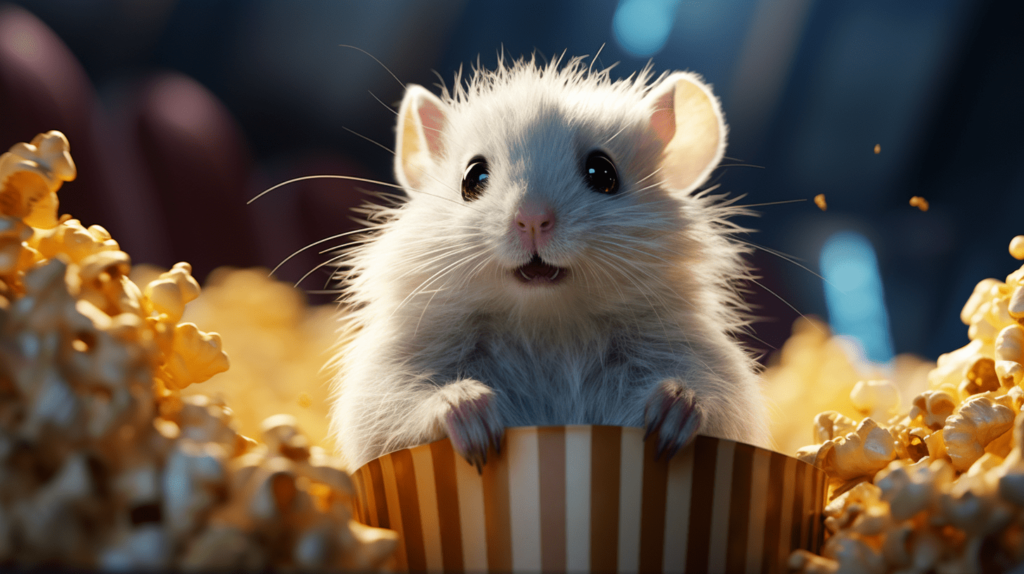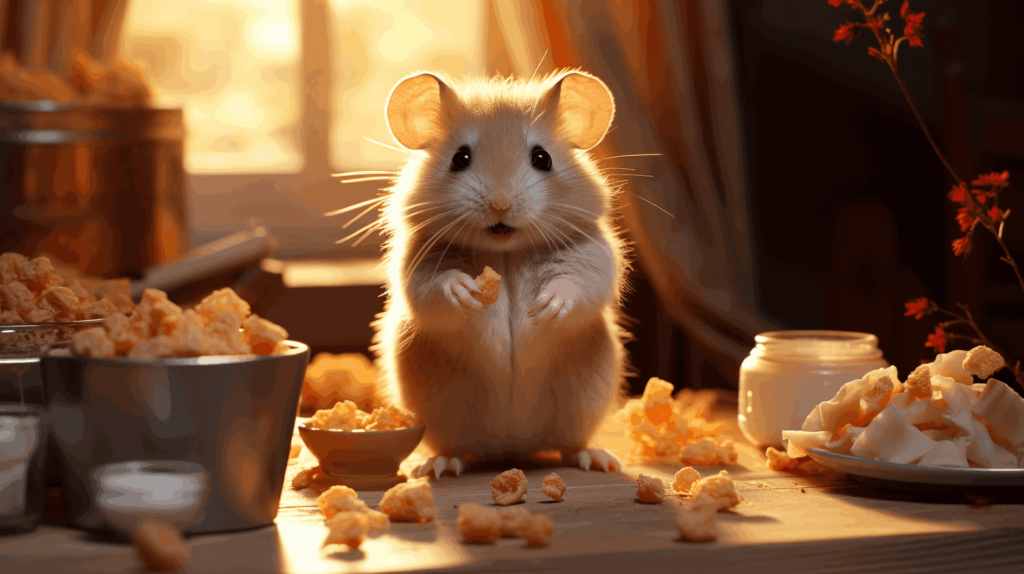Did you know that popcorn is not only enjoyed by humans but also by rats? While rats can safely consume certain types of popcorn, there are essential considerations for rat owners to remember.
This article explores the question, ‘Can rats eat popcorn?’ and provides a comprehensive answer. We will discuss the potential health risks of buttered and salted popcorn, the benefits of plain kernel-less popcorn, and tips on how to feed popcorn to rats to promote their well-being and mental stimulation.
Key Takeaways
- Rats should only be fed on the white fluffy part of popped popcorn to avoid choking on the rigid hulls.
- Buttered popcorn is unhealthy for pet rats as it contains high amounts of fat and salt, leading to obesity and potential health problems.
- Salted popcorn should be avoided as it can cause dehydration, increased blood pressure, and kidney damage in rats.
- When served in moderation, plant kernel-less popcorn provides health benefits to rats, including nutrients such as Vitamin B6, fiber, Vitamin E, iron, and potassium.
Health Risks of Feeding Rats Buttered Popcorn
The article discusses the health risks of feeding rats buttered popcorn. Buttered popcorn contains significant amounts of fat and salt, which are detrimental to the health of rats. The high amounts of fat and salt in buttered popcorn can lead to obesity in rats. Obesity in rats can lead to foot problems, as the excess weight puts pressure on their joints and can cause discomfort. Rats that consume buttered popcorn may also have a shortened life expectancy due to the adverse effects of a high-fat diet. The increased tumor risk in rats is attributed to the potential carcinogenic properties of the ingredients in buttered popcorn. Furthermore, reproductive challenges may arise in rats fed this unhealthy snack. Therefore, avoiding feeding rats buttered popcorn is essential to ensure their overall well-being.
Dangers of Salted Popcorn for Rats
Although salted popcorn may be a popular snack for humans, it poses dangers for rats due to their salt sensitivity and can lead to dehydration and potential kidney damage. Rats should only be fed on the white fluffy part of popped popcorn, as the rigid hulls can lead to choking, especially in mice.
Buttered popcorn is also unhealthy for pet rats, as it contains high amounts of fat and salt, which can lead to obesity. Feeding rats buttered popcorn can result in foot problems, shorter life expectancy, increased risk of tumors, and reproductive challenges.
It is essential to be aware of the risks associated with salted popcorn and ensure that rats are fed a balanced, healthy diet to maintain their well-being.
Obesity and Its Consequences in Rats
Obesity in rats can lead to many health consequences, including foot problems, shorter life expectancy, increased tumor risk, and reproductive challenges.
Just like in humans, obesity in rats can have severe implications for their overall health and well-being. Excess weight can strain their delicate feet, leading to foot problems and discomfort.
Additionally, obesity has been linked to a shorter life expectancy in rats, increasing the risk of developing various health conditions, such as tumors.
Furthermore, obesity can also affect their reproductive capabilities, making it more difficult for them to reproduce successfully.
Therefore, rat owners must maintain a healthy weight for their pets through proper diet and exercise to prevent these potential health issues.
Nutritional Benefits of Plain Kernel-less Popcorn for Rats
Plain kernel-less popcorn provides a variety of essential nutrients, including Vitamin B6, fiber, Vitamin E, iron, Vitamin A, potassium, magnesium, and phosphorous, which contribute to the overall health and well-being of rats.
Popcorn is a nutritious treat that can be given to rats in moderation. It contains essential vitamins and minerals that support various bodily functions. Feeding popcorn to rats can be a fun and interactive way to engage them and promote their mental and physical well-being.
However, it is essential to note that rats should only be given the white fluffy part of popped popcorn, as the rigid hulls can pose a choking hazard. Buttered and salted popcorn should also be avoided, as they can lead to obesity and other health issues in rats.
Ideal Weight Range for Rats
The ideal weight range for rats is crucial for their overall health and longevity. Maintaining a healthy weight is essential in preventing various health issues affecting rats.
The average weight range for females is around 250g-400g, while for males, it is between 300g-600g. Underweight rats may be more susceptible to infections, weakened immune systems, and reproductive difficulties.
On the other hand, overweight rats face an increased risk of obesity-related problems such as foot issues, shortened lifespan, and tumors.
Monitoring a rat’s weight regularly and adjusting their diet and exercise to ensure they stay within the recommended weight range is essential. By doing so, we can promote the overall well-being and longevity of these intelligent and lovable pets.
Using Popcorn as a Treat for Rat Training
A moderate amount of popcorn can be used as an effective treat for rat training, enhancing their learning experience and promoting positive behavior.
Popcorn, when served without butter or salt, provides health benefits to rats, including essential nutrients such as Vitamin B6, fiber, Vitamin E, iron, and potassium.
Feeding popcorn in a feeding toy with puzzles or mazes challenges rats mentally and physically. Mixing small bits of popcorn with small pieces of cardboard stimulates their natural foraging skills.
Placing popcorn treats at strategic points within a multi-level cage keeps rats physically active.
Engaging Rats With Feeding Toys and Puzzles
Engaging rats with feeding toys and puzzles challenges them mentally and physically, promoting their overall well-being and providing a stimulating environment.
Rats are intelligent creatures and need mental stimulation to prevent boredom and improve their quality of life. Feeding toys and puzzles can help fulfill this need by encouraging rats to problem-solve and use their natural foraging instincts.
These toys can be filled with popcorn or other treats, which rats can then work to obtain. This engages their minds and provides physical exercise as they maneuver through the toy or puzzle.
Stimulating Rats’ Natural Foraging Skills With Popcorn
Feeding small bits of popcorn mixed with pieces of cardboard stimulates rats’ natural foraging skills and encourages them to engage in mental and physical activity. This interactive feeding method provides numerous benefits for rats, promoting their overall well-being.
Here are three key points to consider:
- Popcorn as a treat: Using popcorn as a treat can effectively teach tricks, reinforce good behavior, and promote exercise for rats. It serves as a tasty reward while keeping them mentally stimulated.
- Feeding toys and puzzles: Incorporating popcorn into feeding toys with puzzles or mazes mentally and physically challenges rats. This not only satisfies their natural curiosity but also encourages problem-solving skills.
- Multi-level cage enrichment: Placing popcorn treats strategically within a multi-level cage encourages rats to explore and stay physically active. It simulates their natural habitat and provides opportunities for climbing and jumping.
Promoting Physical Activity in Rats With Popcorn Treats
Providing rats with controlled portions of popcorn treats can significantly increase their physical activity levels. When used as a reward or treat, popcorn can be a valuable tool in promoting exercise for rats.
By incorporating popcorn into interactive feeding toys with puzzles or mazes, rats are mentally and physically challenged. Mixing small bits of popcorn with pieces of cardboard stimulates their natural foraging instincts.
Placing popcorn treats strategically within a multi-level cage encourages rats to explore and climb, keeping them physically active. This is especially important as rats are known for their intelligence and need mental stimulation.
However, it’s crucial to remember that rats should only be fed the white fluffy part of popped popcorn and that buttered and salted popcorn should be avoided.
Popcorn and Rats: Exploring Their Intelligence and Well-Being
Rats, however, have shown remarkable problem-solving abilities when presented with popcorn-based puzzles. They can navigate mazes, solve puzzles, and even learn tricks when popcorn is used as a reward.
But beyond their intelligence, it is essential to consider the nutritional value of popcorn for rats. Here are three key points to keep in mind:
- Types of Popcorn Rats Should Avoid: Rats should only be fed on the white fluffy part of popped popcorn, as the rigid hulls can lead to choking. Buttered popcorn is also unhealthy for rats, as it contains high amounts of fat and salt, leading to obesity and other health issues.
- Benefits of Plain Kernel-less Popcorn for Rats: Plain kernel-less popcorn, when served in moderation, offers various health benefits for rats. It contains nutrients such as Vitamin B6, fiber, Vitamin E, iron, and potassium, which contribute to a rat’s growth, hair health, digestion, and more.
- How to Feed Popcorn to Rats: Popcorn can be used as a treat to teach tricks and reinforce good behavior in rats. Feeding popcorn in a feeding toy with puzzles or mazes challenges rats mentally and physically, while mixing small bits of popcorn with small pieces of cardboard stimulates their natural foraging skills.
Conclusion
In conclusion, while rats can safely eat plain kernel-less popcorn in moderation, rat owners must avoid feeding them buttered or salted popcorn due to the potential health risks. Obesity is a concern for rats, and the high fat and salt content in buttered popcorn can contribute to this issue.
However, when served controlled, popcorn can give rats essential nutrients and promote their overall well-being. It is fascinating that popcorn can stimulate rats’ natural foraging skills and engage their intelligence, making it a beneficial treat for these curious creatures.



